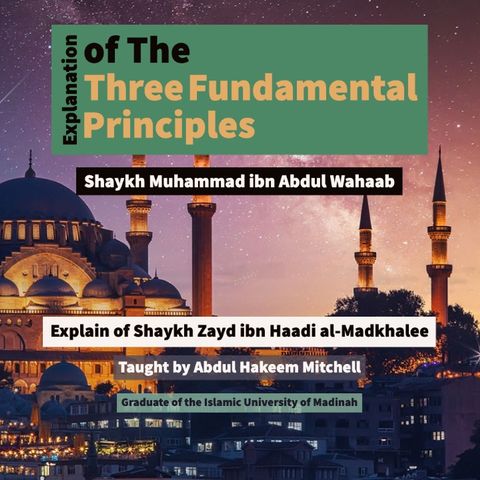18 - Three Fundamental Principles Expl Sh Zayd - Abdulhakeem Mitchell | Manchester

Download and listen anywhere
Download your favorite episodes and enjoy them, wherever you are! Sign up or log in now to access offline listening.
Description
The 3 fundamental Principles Believers call upon Allah with Raghbah (Love & Desire) and Reverential Fear (Khawf) Humility خشوا & خشيا Awe Fear has two types: - Natural Fear -...
show moreBelievers call upon Allah with Raghbah (Love & Desire) and Reverential Fear (Khawf)
Humility خشوا & خشيا Awe
Fear has two types:
- Natural Fear
- Reverential Fear
The ‘Ulamā possess the most fear of Allāh
The believe in Allāh, His Book, and His Messenger, and they act upon that knowledge
One must have knowledge of Allāh to Fear Him
From the Qur’ān “Do not fear them, but Fear Me”
‘Inābah - Submission
Recognising the deficit in one's fulfilment of Allah's rights is encouragement for the believer to strive in doing more & better deeds.
‘Isti’ānah - Appealing for Aid and Assistance from Allāh
This cannot be directed to other than Allah
Anything you seek can only be provided by Alläh, so you must turn to Him
Seeking the means is permissible, but one must ask Allah for aid & success
“To You Alone we Worship, and to You Alone do we seek help” - Fātihah
Isti’āthah - Seeking refuge with Allah
Istighāthah - Seeking Aid from Allah when in great need
If directed to other than Allah, then it must be from sought from one that is:
1. Able
2. Present
3. If not Present, then they take the Hukum (Ruling) of the one that is (meaning, you can communicate with them)
Seeking aid when these conditions are not met is Shirk.
Adh-Dhabh - Slaughtering
Obligatory - Eid al-Adha, Hajj, ‘Aqiqah
Optional - For Guests
Sacrificing for other than Allāh is Shirk
“Whoever believes in Allāh and the Last Day, then let him honour his guest”
From the greatest means of honouring the guest is to sacrifice in order to feed them, however if it is not within a person’s means, then there is nothing upon them.
The Prophet (salallāhu ‘alaihi wasallam), would sometimes be unable to do so, such as when he lacked the wealth. An example of this would be when he would ask ‘Ā’ishah if there was any food, and upon hearing that there was none, he would fast for the day.
An-Nadhm - Vows
A vow cannot be made to other than Allāh.
Restricted/Conditional vows are Makrūh.
The person that makes such a vow (conditional), is stingy. For example, vowing to do righteous deeds if Allāh grants you with what you wish for.
Information
| Author | Learn About Islam |
| Organization | Sunnah Radio |
| Website | - |
| Tags |
Copyright 2024 - Spreaker Inc. an iHeartMedia Company

Comments